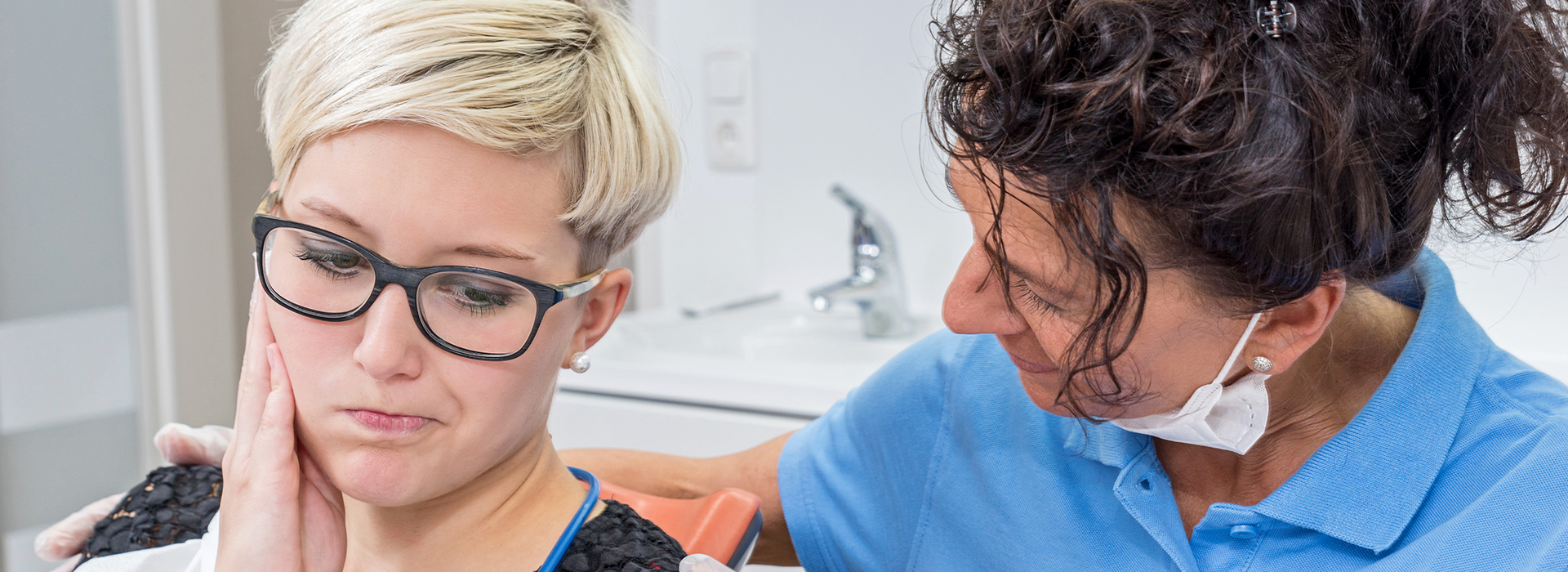North Haven Office

Our Offices
41 Middletown Ave
North Haven, CT 06473
Existing Patients: (203) 234-3900
New Patients: (203) 309-2799
Cromwell Office

Dental problems can escalate quickly. Sharp, persistent tooth pain, sudden swelling in the face or gums, uncontrolled bleeding after trauma, or a tooth that has been knocked out are all signals that prompt attention is needed. Even symptoms that seem minor at first — such as a small crack that causes sensitivity or a filling that suddenly becomes loose — can develop into more serious issues without timely evaluation.
Patients often hesitate because they’re unsure whether a condition qualifies as an emergency. A good rule of thumb is to ask whether the problem interferes with breathing, swallowing, or your ability to sleep or eat comfortably. If the answer is yes, arrange to be seen as soon as possible. Swift action reduces the risk of infection, preserves tooth structure, and improves the chances of saving the natural tooth.
It’s also important to recognize that dental emergencies aren’t limited to injury. Abscesses, severe infections, and sudden onset of intense pain are medical issues that can affect overall health if left untreated. If you notice fever, expanding swelling, or rapidly worsening pain, those are reasons to pursue urgent care rather than waiting for a routine appointment.
When patients arrive with an urgent dental problem, the first priority is comfort and stabilization. Our team focuses on managing pain, controlling infection or bleeding when present, and protecting remaining tooth structure. That may include prescribing appropriate medication, performing temporary repairs to prevent further damage, or providing immediate measures to reduce swelling and discomfort.
Examination and diagnosis take place as quickly as possible using visual assessment and, when needed, digital imaging. Clear communication is part of the process: we explain findings in plain language, outline short-term steps to relieve symptoms, and discuss the long-term plan to restore function and appearance. Patients are involved in decision-making so they understand options and expected outcomes.
Coordination with specialty colleagues happens when a case requires advanced surgical care, endodontic treatment, or prosthetic reconstruction. Our goal is to provide an efficient, well-organized path from the urgent visit to definitive treatment, minimizing interruptions to your daily life while protecting your oral health.
Our practice sees a broad range of urgent dental issues every year. Toothaches caused by deep decay or infection are among the most frequent concerns and often require prompt intervention to prevent spreading infection or loss of the tooth. Broken or fractured teeth, whether from bites or accidents, also demand quick attention to reduce sensitivity and restore function.
Traumatic injuries such as knocked-out (avulsed) teeth, displaced teeth, and severe lacerations to the lips or oral tissues are treated with priority. In many cases, timely action can replant or stabilize a tooth and preserve long-term outcomes. We also address problems with dental work — for example, dislodged crowns, lost fillings, or broken dentures — because these failures can expose tooth structure and invite pain or infection.
Infections and swelling in the gums, tongue, or cheeks, as well as suspicious sores or rapidly growing lesions, are also evaluated urgently. While not every lesion is dangerous, any unusual or painful change that appears suddenly should be reviewed to rule out serious conditions and to begin appropriate care without delay.
Your initial visit is focused on assessment and relief. After a brief medical history and exam, the clinician determines the most appropriate immediate approach — whether that’s a conservative repair, drainage of an abscess, stabilizing a fractured tooth, or beginning a course of antibiotics and scheduling follow-up treatment. If x-rays are needed, digital imaging helps pinpoint the problem with minimal exposure and maximum clarity.
Many emergency procedures are designed to preserve the natural tooth whenever possible. Treatments can range from smoothing a sharp edge to protect soft tissues, placing a temporary or permanent filling, performing root canal therapy to remove an infected nerve, or stabilizing a loose tooth. For traumatic cases, careful repositioning and splinting can often restore normal alignment and function.
Our team emphasizes gentleness and safety throughout every step. Local anesthesia, protective isolation when appropriate, and modern, minimally invasive techniques help keep patients comfortable. We’ll also review aftercare instructions and set a clear timeline for any additional appointments needed to complete definitive restorative or replacement treatment.
After urgent care, follow-up is essential. Short-term measures often require completion with restorative work — for example, a temporary filling placed during an emergency visit will typically be replaced with a permanent restoration, crown, or other prosthetic solution. If a tooth cannot be saved, options for replacement are discussed so patients can make informed choices that suit their health and lifestyle.
Post-treatment care includes managing pain and swelling with safe, recommended approaches, maintaining gentle oral hygiene, and monitoring healing. We provide specific guidance based on the procedure performed and will advise when additional interventions, such as root canal therapy, surgical extraction, implants, or prosthetic rehabilitation, are appropriate.
For patients who experience dental trauma, early restorative planning helps restore normal chewing, speech, and appearance. Whether the next step is a crown, bridge, denture, or implant, a coordinated plan ensures that restorative care proceeds efficiently and predictably, with attention to long-term oral health and function.
At Nova Dental, our priority is to treat urgent dental problems with prompt, professional care while helping patients understand their options and feel confident about the path forward. If you’re experiencing an acute dental issue, please contact us for more information about how we can help.

Pain is your body's way of signaling that something is not quite right and though there are many reasons for oral pain, one of the most common complaints and reasons for seeking urgent dental care is a toothache. Whether you simply need a dental filling, a crown, or require a root canal procedure to save your tooth, we'll alleviate your discomfort and restore the look and function of the involved tooth.

Dental trauma can result in a defect as minor as a small chip in tooth enamel to a more extensive and painful crack or fracture. With sufficient force, a tooth can even be displaced or completely knocked out of its socket. With prompt emergency care, many injured teeth can be restored and saved.

The last teeth in your mouth to develop, wisdom teeth often do not have enough room to fully erupt or may be positioned in the wrong direction. These issues can affect your dental health as well as overall well-being. Our office provides skilled care to address the complications caused by problematic wisdom teeth.

A broken or lost dental prosthesis or restoration can cause embarrassing gaps in your smile as well as compromise your ability to eat and speak with ease. If you've lost or broken a dental filling, denture, crown, or other dental appliance, you can rely on our office to perform a prompt repair or provide a durable and cosmetically pleasing replacement as quickly as possible.
At the office of Nova Dental, emergency appointments are always available. Of course, in addition to providing top treatment for dental emergencies, we also welcome patients searching for high quality and affordable care. We offer a complete range of the latest and best cosmetic and dental services for every member of your family.
If you are suffering from a toothache or have sustained a dental injury, it is important to visit the dentist as soon as possible before more serious complications arise. Whether your dental emergency is painful, if it affects the appearance of your smile, or if you suspect that an infection is present, our office will make every effort to see you as promptly as possible for care.
At the office of Nova Dental, we treat your dental emergency as our top priority. Our caring team will respond to your emergency call right away, making sure you get the gentle, state-of-the-art care you need without delay.
As your trusted emergency dentist in CromwellNorth Haven, we provide the highest quality of care to mitigate the stress, anxiety, and discomfort of dental problems. Our dedicated team will help you start feeling better as soon as we receive your emergency call.
At the office of Nova Dental, we provide skilled and experienced care to effectively resolve a broad range of dental emergencies, restoring a patient's oral health while protecting their overall wellbeing.
However, even so, specific dental emergencies pose significant threats to one's health. These situations require immediate, emergency room care. Serious and potentially life-threatening dental emergencies include significant oral and facial trauma such as jaw fractures, deep wounds or lacerations to the face and mouth, an abscess or infection that causes widespread facial or submandibular swelling, or affects breathing and swallowing.
At the office of Nova Dental, we provide prompt, skilled, and experienced care to address dental emergencies. We understand that finances are always a concern and do our best to provide options in care that are both affordable and respect your budget.
Once we've had the opportunity to examine your smile, we can give you a clear picture of any existing dental issues, along with a quote for what the cost of treatment will be. The cost of care all depends upon the extent and complexity of issues affecting the health or appearance of your smile and the types of procedures that are required.
To help alleviate any additional stress or delay, you can count on our staff to work with you to optimize coverage for your dental care and to minimize your out-of-pocket expenses. For patients without insurance, we strive to make things easier as well! We invite you to visit our financial information page or speak to an expert in our business office.
Dental emergencies are often painful and debilitating experiences. For this reason it's important to have an emergency dentist in CromwellNorth Haven, who welcomes patients with urgent dental needs while providing the prompt care required to restore oral health.
Here are just some of the reasons why so many patients choose our office for emergency dental care and to meet their family's dental needs:
We're dedicated to helping patients enjoy good oral health and beautiful smiles. We look forward to helping you keep your smile in tip-top condition. You can rest assured that our highly skilled office team will provide you the highest quality of state-of-the-art dental care and have you smiling again in no time!
To make an appointment or for more information on our office and the many state-of-the-art services we provide, give us a call today.
Dental problems can escalate quickly, and certain signs merit immediate attention. Sharp, persistent tooth pain, sudden or expanding facial or gum swelling, uncontrolled bleeding after trauma, and a tooth that has been knocked out are examples of conditions that require urgent evaluation. Fever, difficulty breathing or swallowing, and rapidly worsening pain are additional red flags that should prompt same-day care.
If you are unsure whether a condition qualifies as an emergency, ask whether it interferes with breathing, swallowing, sleeping or eating comfortably. When the answer is yes, arrange to be seen as soon as possible to reduce the risk of infection and to improve the chance of preserving the natural tooth. Prompt assessment allows clinicians to stabilize the problem and map out an efficient plan for definitive treatment.
Time is critical when a tooth is avulsed. Handle the tooth by the crown only, rinse off visible dirt with cool water if necessary, and avoid scrubbing the root or touching it with your fingers. If possible, gently try to reinsert the tooth into its socket and hold it in place, or transport it in cold milk, saline, or the patient’s saliva if reinsertion is not feasible.
Control bleeding with clean gauze and seek emergency dental care right away; the likelihood of saving the tooth decreases significantly after the first hour. Keep the patient calm, avoid excessive handling of the tooth, and bring the tooth to the appointment in the storage medium you used. The dental team will assess, attempt replantation or stabilization, and provide follow-up instructions to maximize the chance of successful healing.
Initial management focuses on relieving pain and controlling infection. The clinician will perform a focused exam, often with digital imaging, to identify the source of pain and determine whether drainage, root canal therapy, or temporary stabilization is needed. When an abscess is present, drainage may be performed and measures taken to reduce pressure and discomfort immediately.
Antibiotics are used selectively when there are signs of systemic infection, spreading swelling or when drainage cannot be achieved promptly. Definitive treatment typically follows once the acute symptoms are controlled and may include root canal therapy or extraction, depending on the tooth’s condition. The goal is to resolve infection, protect nearby structures and restore oral function as quickly as is safely possible.
Emergency visits begin with a brief medical history and focused exam to triage concerns and prioritize comfort. Our team works to manage pain, control bleeding or infection, and stabilize injured or compromised teeth using local anesthesia, temporary repairs or splinting when appropriate. Digital imaging is used as needed to clarify the diagnosis and guide immediate interventions.
We communicate findings in plain language and outline both short-term steps to relieve symptoms and the recommended path to definitive care. If a case requires specialty input, we coordinate referrals to oral surgeons, endodontists or other specialists to ensure an efficient, organized transition to advanced treatment. Patients receive clear aftercare instructions and a follow-up plan to complete restorative work when indicated.
Whether a fractured or displaced tooth can be saved depends on the location and extent of the damage, the integrity of the root and the time elapsed since injury. Minor chips and cracks that do not extend into the root are often repairable with bonding or a crown, while fractures that expose the nerve may require root canal therapy. Displaced teeth can frequently be repositioned and stabilized if treated promptly.
Severe injuries that compromise the tooth’s structure or its supporting bone may make saving the tooth impractical, in which case extraction and subsequent restorative options are discussed. Early assessment and treatment improve the odds of preserving the natural tooth, so prompt attention after trauma is essential. The clinical team will explain the likely outcomes and help you choose the best path forward for function and appearance.
Begin by applying firm, continuous pressure to the bleeding site with clean gauze or a folded cloth for 10 to 20 minutes without checking repeatedly, which can disrupt clot formation. Keep the head elevated and encourage the patient to sit upright or lean slightly forward to avoid swallowing blood. A cold compress applied externally to the cheek can help reduce blood flow and swelling.
If bleeding continues despite these measures, or if bleeding is heavy after serious facial injury, seek immediate professional care because persistent hemorrhage may signal a more significant injury. The dental team may need to control bleeding with sutures, local hemostatic agents or other interventions and will evaluate for lacerations, fractured bone or other trauma. Rapid assessment helps prevent complications and promotes safe recovery.
Antibiotics are prescribed when there are clear signs of bacterial infection, spreading or systemic involvement such as fever or rapidly expanding swelling. They are not always necessary for every emergency visit; the clinician will evaluate whether antibiotics are appropriate based on the diagnosis and medical history. When prescribed, instructions about dosage and the importance of completing the course are explained clearly.
Pain control is a core component of emergency management and may include recommended over-the-counter analgesics or prescription medications for more severe discomfort. The team reviews any allergies or current medications to avoid interactions and advises on safe, effective use. Aftercare guidance addresses expected discomfort, when to resume normal activity, and indicators that warrant re-evaluation.
Certain emergencies require specialists for optimal outcomes, including endodontists for complex root canal issues, oral surgeons for advanced trauma or impacted teeth, and prosthodontists for complicated restorative planning. Cases that involve significant facial fractures, deep bone infection or extensive soft-tissue injury often need multidisciplinary management. Timely referral ensures that patients receive the right level of care without unnecessary delay.
The dental team will coordinate any necessary consultations and provide interim treatment to stabilize the condition while arranging specialist care. Clear communication among providers and with the patient helps the transition to definitive treatment proceed efficiently. This collaborative approach reduces risk, shortens recovery time and improves long-term function and esthetics.
Follow the aftercare instructions provided at discharge carefully, including medication regimens, oral hygiene modifications and activity restrictions. Maintain a soft diet as advised, avoid chewing on the affected side, and use gentle rinses if recommended to keep the area clean without disrupting healing tissues. Monitor the site for increasing pain, swelling, fever or unusual drainage, and contact the office if these signs occur.
Complete any scheduled follow-up appointments to transition from temporary measures to definitive restorative care, such as a permanent filling, crown, root canal or prosthetic replacement. For patients of Nova Dental who have received emergency care, the team will help plan and coordinate those next steps to restore function and appearance in a timely manner. Keeping follow-up commitments helps ensure the best long-term results.
Yes. Facial swelling and fever can indicate a spreading infection that may involve deeper tissues and potentially affect breathing or systemic health. When swelling is enlarging rapidly, causes difficulty swallowing or breathing, or is accompanied by fever and malaise, seek urgent care immediately because these signs may require prompt medical or hospital-based intervention.
Early evaluation allows for appropriate imaging, drainage if necessary, and initiation of antibiotics or other therapies to control the infection. Do not delay seeking care for progressive swelling or systemic symptoms, as timely treatment reduces the risk of severe complications and supports a safer, faster recovery.
